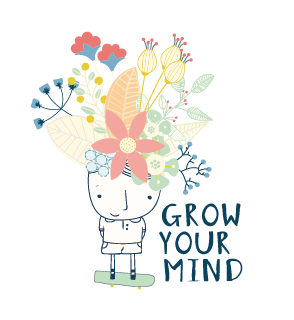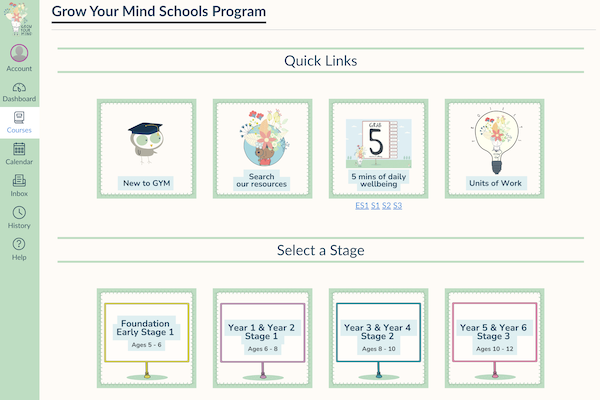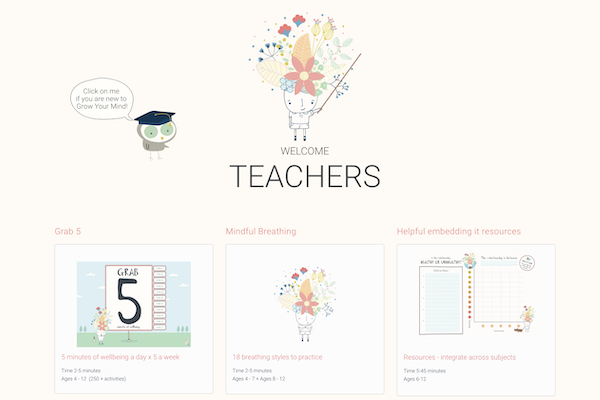A look at why schools should take a holistic approach to wellbeing. One that also includes teachers!
In recent decades, schools have become more and more focused on student wellbeing. They understand that in order to learn, students must have a strong social and emotional foundation.
In fact, the link between student wellbeing and academic performance has been shown through countless studies. It’s so well established that learning social and emotional awareness and management skills is built into the Australian Curriculum.
With the average onset age of mental illness decreasing, primary schools in particular have been identified as an important setting for health promotion and education. But when it comes to wellbeing programs, every school takes a different approach. And usually this approach is one that relies heavily on teachers.
At a time when teachers are more stretched than ever, having them to plan, create and run wellbeing programs is a big ask. Even when outside programs are brought in it can be up to the teacher to deliver them or run follow-up activities.
Which means that running wellbeing programs for students can often lead to increased teacher stress. After all, teachers are experts at putting the needs of others ahead of their own. But how can we expect to teach our students how to look after their mental health when we don’t look after our own?
You can’t expect students to be able to emotionally regulate if you struggle with this as an educator. It is unrealistic to expect students to show kindness to others and to themselves if we don’t treat ourselves with the same kindness. So why do we think it’s okay to teach our students about mental health when we’ve forgotten how to look after our own?
You can’t fill from an empty cup
Teachers are stressed. Especially after the chaos of the past 2 years. And this stress is affecting their mental health.
More than half of Australian teachers suffer from anxiety and almost one-fifth are depressed. One Australian survey found that 18% of respondents met the criteria for moderate to severe depression and almost 62% for moderate to severe anxiety. 20% had severe anxiety. Over halfof these teachers suffered physical symptoms as a result of this anxiety and depression, including pain, nausea, dizziness and fainting.
These numbers are troubling on their own, but when compared to the national averages it’s clear just how unacceptable these statistics are. Approximately 10% of Australians will experience depression in their lifetime, 13% will experience anxiety and 7% will suffer from associated physical symptoms.
There are several reasons why teachers experience stress. According to the OECD’s Teaching and Learning International Survey (TALIS), 43% of teachers reported one of their major sources of stress as ‘having too much marking’. But the biggest source of stress for Australian teachers was ‘having too much administrative work’ (55%). Australian teachers spend more time on non-teaching tasks than almost every other country in the OECD. Our average is the fourth largest, with the performance of management and administration tasks the most significant contributor to non-teaching hours.
So at a time when teachers are experiencing unprecedented levels of stress, how can we expect them to carry the beacon for wellbeing with students?
Research tells us that we really can’t. Teacher wellbeing directly affects students and if the aim of our wellbeing programs are to teach students to take care of their mental health, adding to teacher stress is certainly not an effective approach.
Student wellbeing starts with teacher wellbeing
If schools want to truly support the wellbeing of students, they need to do so by building a wellbeing culture for the whole school. One that has shared responsibility between teachers, leaders, staff and students. And most importantly, one that focuses first on the teacher — because you can’t fill from an empty cup.
When we start with teacher wellbeing, we’re laying the foundation for positive mental health outcomes for the whole school community. But in order to do this we must educate teachers about the most effective, evidence-based ways to look after themselves. We must show them that they can’t afford not to prioritise their own mental health, and we must ensure the school maintains a culture that gives teachers the space to do this.
Ideally, we do this with a program that gives the whole school a common language for wellbeing. That way, teachers, students, leaders, staff and parents can support each other and make looking after mental health as common as looking after physical health.
Grow Your Mind is one program that does exactly this. Designed by teachers, for teachers, the program embeds a foundational language for wellbeing across the whole school by linking social and emotional education directly to the brain with a playful animal analogy that is developmentally appropriate for young students, but resonates with older students and adults too.
A whole school approach in action
If you were a fly on the wall in a Grow Your Mind classroom you would immediately see that character strength education is at the forefront. Students from kindergarten and up would be learning what character strengths are, how to spot them in others, in the pages of books and within themselves. You would quickly see that alongside learning to adopt a growth mindset, students and teachers would be learning about what a benefit mindset is and the fact that when we think of others and actively help them we are not only performing a kindness to them, we are also building our own capacity to be resilient.
You would see physical and digital resources that encourage children to be aware of the good things in their lives and to adopt a gratitude practice that feels authentic to them. You would hear children being able to identify what a respectful relationship is as well as feeling confident to read the signs that a friendship is no longer healthy. You may see school staff talking about their own personal values and how these shape their decisions throughout the day. Parents themselves would receive information and be asked to participate in webinars about multiple positive health topics.
All of them, young and old(er) would know about the key parts of the brain and have an awareness of ways to promote good brain health. Even your 5 year olds might tell you about their Guard Dog, the amygdala, who sometimes mistakes every day setbacks or sadness as a BIG threat. Your older students might share with you some information about their Wise Owl, the prefrontal cortex, and the ways they plan to wake it up that day. Emotional literacy would be growing with every year they are at school. This might look like students being able to name their feelings accurately as well as members of the school community having an understanding that all feelings are welcome (but not all reactions are!).
Teachers would be committed to doing things inside and outside of the classroom that bring them joy, because they understand that they can’t not prioritise their own mental health.
And finally, everyone would know that wellbeing is not a spectator sport.


